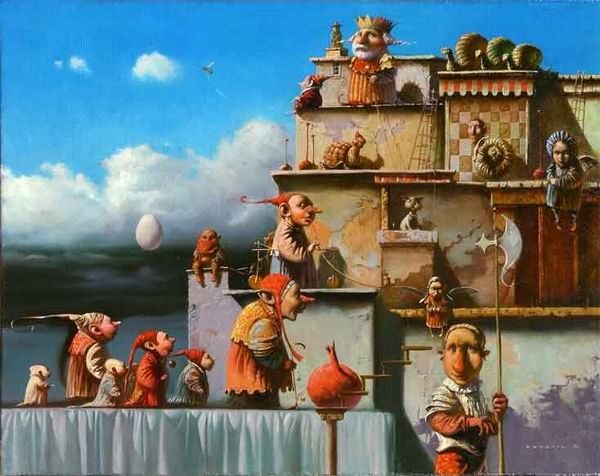
Horsey, a Cult Chess Figure, in Arts
How come chess Knight has become sort of cult figure among all other chessmen?
A mere look at chess knight is enough to make an unmistakable association with our game. It has long fired popular imagination and mystery surrounding chess among both established players and layman.
Chess Knight is a very powerful and dangerous warrior representing a soldier born to fight with heavy armor, and with the skills of horse riding back in the ancient times when the game originated. It was the second-strongest (after Rook) chessman in the very beginning creating havoc in the enemy ranks. It is the only chessman that is unassailable when it is attacking itself (save enemy Knights). No other man has such a skill. I remember, when I was getting started in chess I used to be fearing its unexpected raids and plunders, forking my men. I simply had Knightmares. I guess you did, too.
The piece is named differently in different languages. "Usually it is a horse (eg Azerbaijani at, Chinese ma, Dutch paard, Javanese jaran) or a rider (French cavalier, Czech jezdec) or a horse with a rider (Finnish ratsu) or a kind of rider (English knight, Irish ridire, Breton marc'heg). In many countries knight's name is linked with the cavalry which it originally represented, but the German Springer means jumper which is a kind of horse in sports." Chess Pieces in 78 Different Languages, by Ari Luiro.
I started putting together my horseys in this post from my database of about 9,000 chess pix. At a point I counted how many I already put and realized there was one shy of hundred![]() So need to split them into 2-3 posts for you.
So need to split them into 2-3 posts for you.
Hope you will be enjoying my horseys.
.

Ignacio Guerrero (Mexican)
.

Ignacio Guerrero
.

Daniel Merriam (American), Chess
.

Samuel Bak (Israeli American), A Knight in the intifada
.

Roman Urbinsky (Russian), Zebra is also a Horse
.

Man Ray (French), Knights Tour
.

Man Ray (1890 – 1977) The Red Knight, 1938
.

La vie au grand aire, by René Magritte (1949). The taste for paradox and for the surprising we always expect from the Belgian artist
.

Emilio Rosenblueth (Mexican, 1896 – 1945) El caballo de ajedrez, 1938
.
 Vito Campanella (Italian/Argentinian)
Vito Campanella (Italian/Argentinian)
.

Linda Herzog (American), Draw, 2005
.

Murata Ely, JP chess, 2001
.
 Carlos Orduña Barrera (México), Chess kingdom I
Carlos Orduña Barrera (México), Chess kingdom I
 An 800-year-old medieval knight from Norway with Islamic-inspired patterns
An 800-year-old medieval knight from Norway with Islamic-inspired patterns
.

Knight on horseback battling a dragon, walrus ivory, cca 1250, Metropoliten Museum of Art, New York
.

Ivory chess knight 1370-1400
.

Burmese chess knight 1780
 Chess Knight, Steel sculpture by Elke Rehder (German)
Chess Knight, Steel sculpture by Elke Rehder (German)
.

Sarah Ortmeyer Kish Kush (Israeli), Dvir Gallery, Tel Aviv, 2014
.
 Ceramic Knight figurine
Ceramic Knight figurine
.

Chess Horse with Black Shadow, 2015 (ceramic and glaze) by Saya Moriyasu (American of a Japanese father and Oregon born and raised-on-a-farm mother
.
 Enrico Baj (Italian), Cavalo (Knight, a piece of chess set)
Enrico Baj (Italian), Cavalo (Knight, a piece of chess set)
.

Knight Jose Maria Rodriguez Madoz (1958) aka Chema Madoz, is a Spanish photographer, best known for his black and white surrealist and poetic photographs
.

Irene Smirnova Zaychenko
.

Jose Echeveria (Ecuadorian), Dolor galope (Gallop pain)

Jose Echeverria, Esperando bajo la luna (Waiting under the Moon)

Jose Luis Munoz Luque (Spanish)
.
See you next time with more chess horseys. Stay tuned.
.
.

